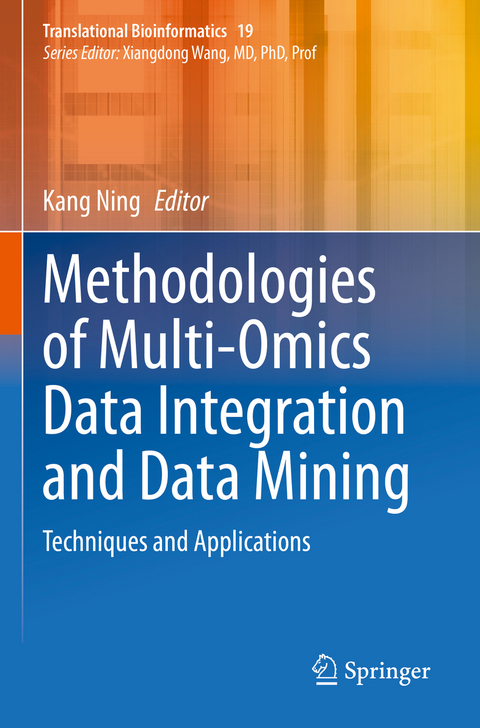
Methodologies of Multi-Omics Data Integration and Data Mining
Springer Verlag, Singapore
978-981-19-8212-5 (ISBN)
Kang Ning, Professor, PI of Microbial Bioinformatics Group, Director of Department of Bioinformatics and Systems Biology, School of Life Science and Technology, Huazhong University of Science and Technology. He obtained his BS in Computer Science from USTC and PhD in Bioinformatics from NUS. He has had his Post-Doc training in Bioinformatics from University of Michigan. Dr. Ning has more than 20 years of experiences in bioinformatics for omics big-data integration, mirobiome analyses and single-cell analyses. His current research interests include AI method for multi-omics especially metagenomics data mining, as well as their applications. He is also interested in synthetic biology and high-performance-computation. Dr. Ning is the leading or corresponding author of over 100 papers and reviews on leading journals including PNAS, Gut, Annals of the Rheumatic Diseases, Genome Biology, Genome Medicine, Microbiome, Briefings in Bioinformatics, Bioinformatics, Nucleic Acids Research,which have more than 5,000 citations. He has been the committee members of several national bioinformatics and biology big-data committees in China, such as the deputy director of Genomic Informatics Branch of China Bioinformatics Society. He is also the distinguished member of China Computer Federation. He serves as an editorial board member of several journals inlcuding Genomics Proteomics and Bioinformatics, Microbiology Spectrum, iMeta and Scientific Reports, and served as reviewers for several international funding agencies including UK-BBSRC and UK-NERC. He has collaborations with biologists, doctors and statisticians in many countries, and has given talks on international conferences for many times.
Chapter 1. Introduction to multi-omics.- Part 1. Omics integration techniques.- Chapter 2. Biomedical applications: the need for multi-omics.- Chapter 3. Omics technologies and big data.- Chapter 4. Multi-omics data mining techniques: algorithms and software.- Part 2. Applications of multi-omics analyses.- Chapter 5. Multi-omics data analysis for cancer research: colorectal cancer, liver cancer and lung cancer.- Chapter 6. Multi-omics data analysis for inflammation disease research: correlation analysis, causal analysis and network analysis.- Chapter 7. Microbiome data analysis and interpretation: correlation inferences and dynamic pattern discovery.- Chapter 8. Current progress of bioinformatics for human health.
| Erscheinungsdatum | 16.01.2024 |
|---|---|
| Reihe/Serie | Translational Bioinformatics |
| Zusatzinfo | 1 Illustrations, black and white; XI, 167 p. 1 illus. |
| Verlagsort | Singapore |
| Sprache | englisch |
| Maße | 155 x 235 mm |
| Themenwelt | Mathematik / Informatik ► Mathematik |
| Medizin / Pharmazie ► Studium | |
| Naturwissenschaften ► Biologie ► Genetik / Molekularbiologie | |
| Schlagworte | Artificial Intelligence • Big-data • Data Mining • microbiome • Multiple omics |
| ISBN-10 | 981-19-8212-0 / 9811982120 |
| ISBN-13 | 978-981-19-8212-5 / 9789811982125 |
| Zustand | Neuware |
| Informationen gemäß Produktsicherheitsverordnung (GPSR) | |
| Haben Sie eine Frage zum Produkt? |
aus dem Bereich


